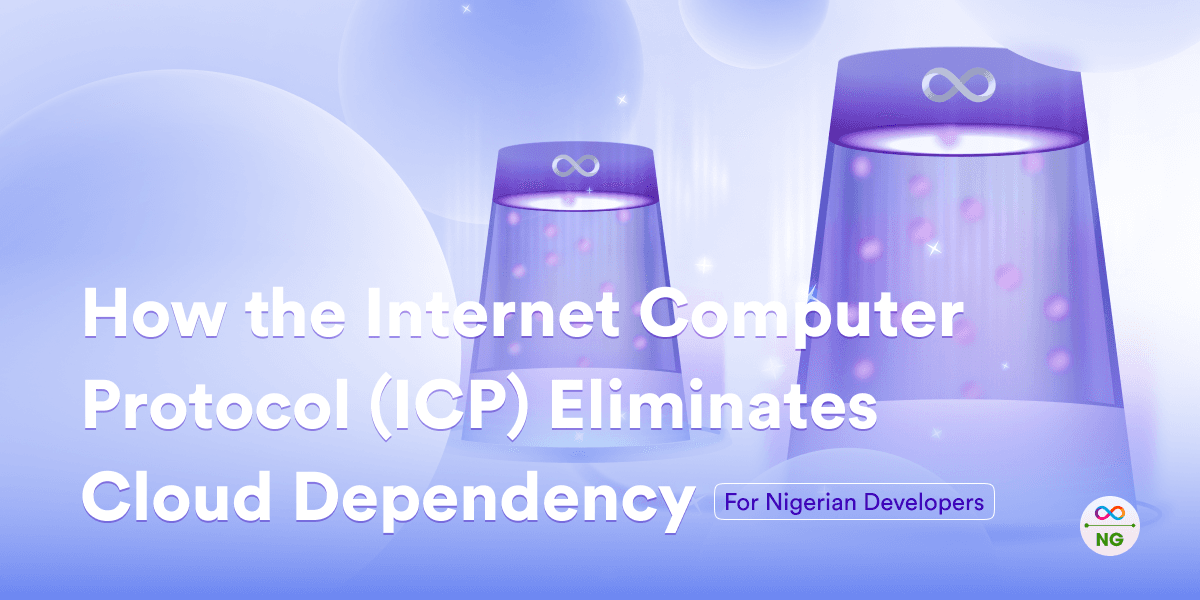How the Internet Computer Protocol (ICP) Eliminates Cloud Dependency for Nigerian Developers
January 28, 2025

The Internet Computer Protocol is not just another blockchain platform trying to onboard more people without considering the challenges and needs of its users.
As a Nigerian developer, we know that traditional cloud services like AWS, Google Cloud, and Microsoft Azure often present challenges such as high costs, limited scalability, and data ownership concerns. The pay-as-you-go model can quickly become expensive, especially for startups and small businesses, and currency fluctuations further complicate affordability.
Statista reports that 25% of developers in Nigeria struggle with these high costs. Cloud services also face scalability limitations, and centralised data centres may cause slower performance, particularly for local users. Data privacy concerns arise as cloud providers control and store sensitive information, raising security issues in light of strict local regulations.
The Internet Computer Protocol (ICP) offers a decentralised alternative, providing more affordable, scalable, and secure solutions for developers.
Explore the Internet Computer Protocol (ICP)
ICP offers a decentralised alternative to traditional cloud services. Instead of relying on centralised data centres and expensive, proprietary infrastructure, ICP operates on a distributed network of independent data centres around the world. This network is powered by nodes that contribute to the collective infrastructure, enabling ICP to provide an entirely new way to build and deploy applications without the limitations of traditional cloud services.
A Summary of Why ICP is a Game-Changer for Developers
ICP offers a transformative solution for Nigerian developers by providing cost-effective “which also involves zero Gas Fee processing”, scalable, and secure alternatives to traditional cloud services.
It eliminates the need for expensive cloud subscriptions, allowing developers to pay only for the resources they use and directly host applications on the network. This decentralised model reduces overhead costs, enabling more budget allocation toward innovation.
ICP’s decentralised network allows for seamless scaling, adjusting dynamically to growing user demands without costly manual upgrades. Whether you are developing e-learning platforms like Andela Academy or logistics solutions like Kobo360, ICP can handle increased traffic effortlessly.
Built on blockchain technology, ICP ensures secure and transparent data ownership, giving developers greater control over data storage and access. It offers enhanced security, especially for fintech applications, where protecting sensitive financial data is paramount.
For fintech, ICP supports secure, scalable applications that can handle millions of transactions without the high costs of traditional cloud services. In e-learning, ICP’s scalable infrastructure means you don't need to manage servers or worry about performance during peak usage times. For logistics, ICP’s decentralised nature ensures security and scalability for growing supply chains. And the list could go on and on.
Conclusion
If you are looking for a cost-effective and highly functional blockchain platform for your Dapps, ICP represents a major shift in how applications are developed, deployed, and maintained.
The time to explore ICP is now. Embrace the future of decentralised technology and unlock the potential to grow your projects affordably, securely, and efficiently. With ICP, you no longer have to be dependent on traditional cloud services—you can take control of your applications and your data, and build the next big thing in Nigeria’s tech ecosystem.
Article By: Mana Lamja